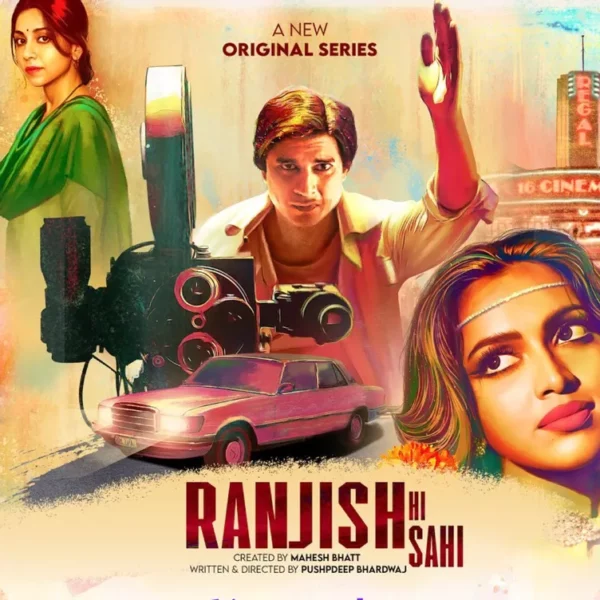
Assuming you will move past inquiries of beauty and style about Mahesh Bhatt fictionalizing his extra-conjugal undertaking with Parveen Babi for the fourth time, you would conceivably enjoy the pristine Voot Select assortment Ranjish Hello Sahi. The title, that signifies “So imagine a scenario where there’s pain?”, is dazzled by the Ahmed Faraz ghazal of the indistinguishable title, spread the word about well by Mehdi Hasan. It’s tied in with longing for a since a long time ago withdrew darling. Bhatt’s tries to do equity to the stacked title are estimable.
Bhatt recently investigated his issue with Babi while he was hitched to Kiran Bhatt in Arth (1982) and Phir Teri Kahaani Yaad Aayee (1993). In 2006, he got back to the subject with Woh Lamhe, coordinated by his nephew, Mohit Suri. In examination, Ranjish Hi Sahi, being a web series, gets an opportunity to offer a 360-degree perspective on the Mahesh Bhatt-Parveen Babi-Kiran Bhatt adventure.
Skilled exhibitions, particularly by Amala Paul as the Babi substitute Amna Parvez, and a drawing in screenplay by chief Pushpdeep Bharadwaj, make Ranjish Hi Sahi reliably watchable. Tahir Raj Bhasin is adequate as the red hot, battling producer Shankar Vats, Mahesh Bhatt’s most recent on-screen adaptation. Amrita Puri carries a ton of poise to the job of his significant other, Anju, enlivened by Kiran Bhatt.
Arth took a gander at the relationship according to the viewpoint of the enduring spouse, attempting to assemble another life after her better half leaves her. Phir Teri Kahaani Yaad Aayee and Woh Lamhe were lesser endeavors that were very taken out from the genuine occasions that roused them.
What is especially new in Ranjish Hi Sahi is the compassion and graciousness with which each character is investigated. Maybe Mahesh Bhatt is pardoning himself for his deficiencies and sins as spouse, father, sweetheart and child. This is delightfully portrayed in a discussion scene in the last episode among Shankar and his mom, Rukhsar, played by Zarina Wahab.
Ranjish Hi Sahi, interestingly, brings the crowd straight into the 1970s, when Mahesh Bhatt was a striving producer and Parveen Babi was among the top stars of the day. We get a great deal of spot-the-genuine individual this-character-was-enlivened by minutes. There’s Kabir Bedi, Zeenat Aman, Shakti Samanta, and some more. (The entertainers picked to play Vinod Kumar and Amitabh Bachchan gave me a cerebral pain, particularly when the swank Tahir Raj Bhasin has the Mahesh Bhatt job). We get a comprehension of Mahesh Bhatt’s unassuming beginnings when he was simply beginning as a chief.
A speedy recap of the genuine story, which we know on account of Mahesh Bhatt involving film as admission corner: Mahesh Bhatt is the child of producer Nanabhai Bhatt and entertainer Shirin Mohammad Ali. (This contention about a Hindu dad never legitimizing his relationship with his Muslim darling was fictionalized in Bhatt’s last movie as a chief, Zakhm, before he got back with the pointless Sadak 2 out of 2020). During the 70s, Bhatt was attempting to get by as a chief while endeavoring to satisfy his innovative vision.
I winced at many cases where the composing is attempting legitimize the show’s presence. It is continually recommended that Bhatt owed it to Babi and her memory that he told their story really, one final time, since she was a particularly colossal piece of his life, and Babi’s inheritance has been discolored over the course of the years with tales and tattle about her psychological wellness, compulsion issues, wantonness, the rundown continues.
Bharadwaj’s somewhat sensational treatment of road level authenticity is ordinary Bhatt. Contrasted with the normal web series today, Ranjish Hi Sahi feels old fashioned: shots are permitted to wait, exhibitions can inhale, the foundation score isn’t meddling. True to form from a Bhatt creation, the show is supported by a strong soundtrack, highlighting tunes by Aabhas and Shreyas and Prashad Sashte, with verses by Ravi and Shakeel Azmi.
In spite of the demeanor of abuse that sticks around the reason, Ranjish Hi Sahi is oftentimes contacting with its genuineness. What we see is the tale of a man attempting to make the best choice. With Arth, for instance, Bhatt was less kind to himself. It was obviously a result of culpability. Ranjish Hi Sahi feels like a result of teary recognition in the fall of his life.
